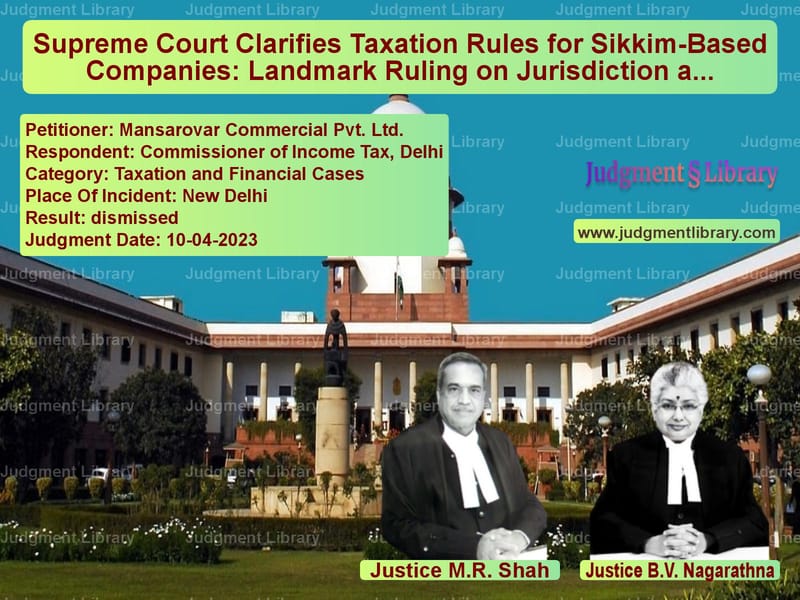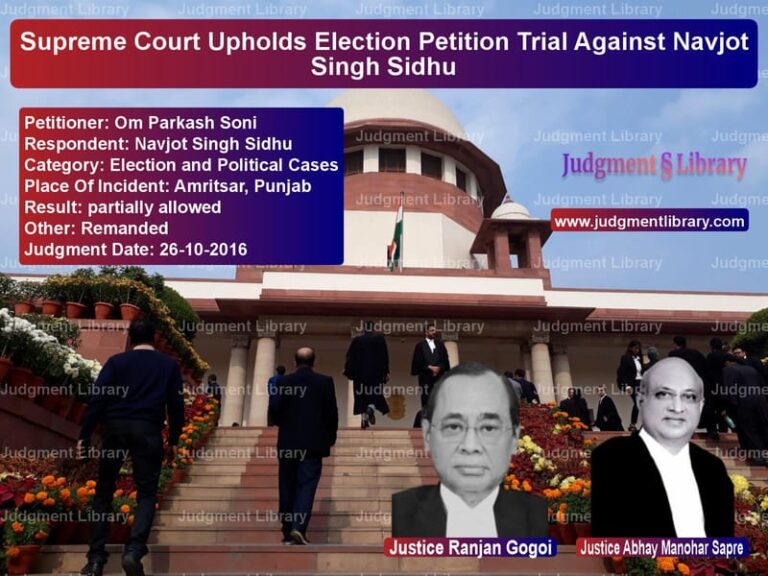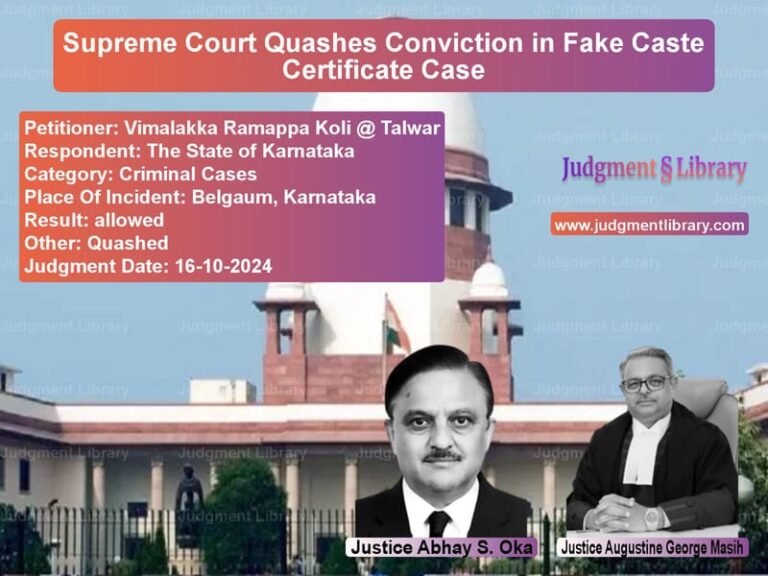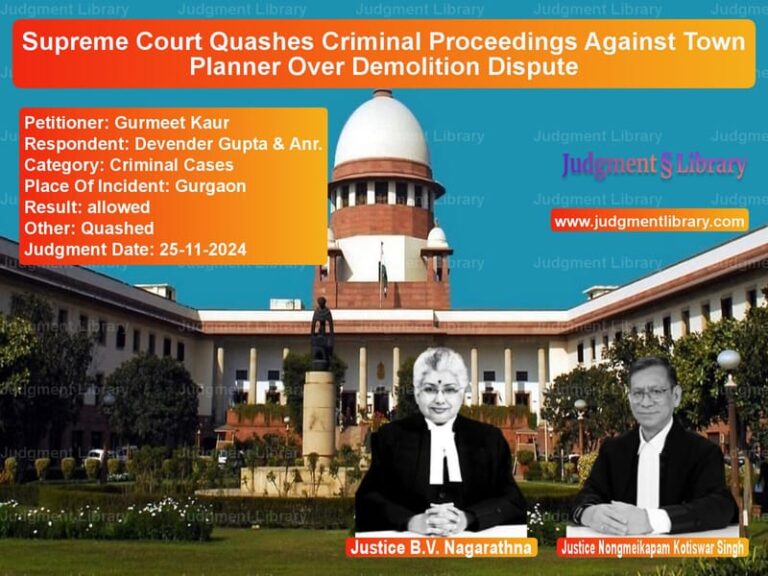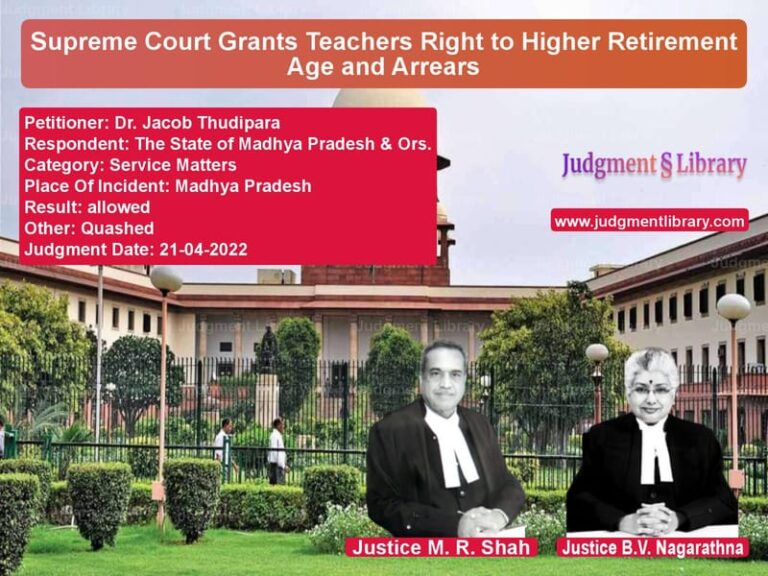Supreme Court Clarifies Taxation Rules for Sikkim-Based Companies: Landmark Ruling on Jurisdiction and Income Tax Act
The Supreme Court of India, in a significant judgment in Mansarovar Commercial Pvt. Ltd. v. Commissioner of Income Tax, Delhi, addressed the applicability of the Income Tax Act, 1961, to companies registered in Sikkim and the issue of jurisdiction in assessing their tax liabilities. The ruling held that despite being registered in Sikkim, companies with management and control in India are liable to be taxed under the Income Tax Act, 1961.
Background of the Case
The appeals were filed by five companies—Mansarovar Commercial Pvt. Ltd., Sovereign Commercial Pvt. Ltd., Swastik Commercial Pvt. Ltd., Trishul Commercial Pvt. Ltd., and Pasupati Nath Commercial Pvt. Ltd.—which were incorporated under the Sikkim Companies Registration Act, 1961. These companies claimed to be carrying out business in cardamom and agricultural products in Sikkim. However, a tax dispute arose regarding their income for the assessment years 1987-88, 1988-89, and 1989-90.
The companies argued that they were governed by the Sikkim State Income-Tax Manual, 1948, and were outside the purview of the Income Tax Act, 1961, which was extended to Sikkim only from April 1, 1990. The Income Tax Department, however, contended that these companies had their management and control in New Delhi and were thus taxable under Indian income tax laws.
Petitioner’s Arguments
The petitioners (Sikkim-based companies) argued:
- That they were incorporated in Sikkim and therefore governed by the Sikkim Income Tax Manual, 1948, and not the Income Tax Act, 1961.
- That their income was generated from business activities in Sikkim, making them non-resident for Indian taxation purposes.
- The income tax authorities in Delhi had no jurisdiction to assess their income.
- The companies had filed tax returns in Sikkim, and they had already paid income tax there, preventing taxation under Indian laws.
Respondent’s Arguments
The Income Tax Department countered:
- That a search conducted on March 15, 1990, at the office of M/s Rattan Gupta & Co., Chartered Accountants, in New Delhi revealed that the management and control of these companies were being conducted from Delhi.
- The books of accounts, blank signed cheques, letterheads, and rubber stamps of the companies were found in the possession of Rattan Gupta, proving that the real control and management were in India.
- The directors of the companies were based in New Delhi, and none had ever visited Sikkim.
- The income earned by these companies was routed through Sikkim to avoid taxation under the Income Tax Act, 1961.
- Under Section 6(3) of the Income Tax Act, a company is a resident in India if its control and management are exercised from India.
Key Legal Issues Considered by the Court
- Was the Income Tax Act, 1961, applicable to these companies before its official extension to Sikkim in 1990?
- Did the Delhi income tax authorities have jurisdiction over these companies?
- Were the companies’ activities in Sikkim genuine, or was Sikkim used as a tax shelter?
Supreme Court’s Observations
The Supreme Court ruled in favor of the Income Tax Department, stating:
- “The control and management of the companies were entirely in New Delhi, not Sikkim. The mere incorporation in Sikkim does not grant immunity from Indian tax laws.”
- “A company is considered a resident of India if its central management and control are in India, even if its business operations are elsewhere.”
- “The evidence found in the search at M/s Rattan Gupta & Co. confirmed that key financial decisions were made in Delhi.”
- “There is no presumption that a company’s control is at its registered office. The real test is where its decisions are made.”
- “The Income Tax Act, 1961, is applicable to all residents of India, including companies whose management and control are located in India.”
Final Judgment
The Supreme Court upheld the High Court’s ruling, stating:
“The companies in question were effectively controlled and managed from New Delhi. The assessment under the Income Tax Act, 1961, by Delhi authorities was valid. The appeals filed by the companies are dismissed.”
Impact of the Judgment
- Clarity on taxation of Sikkim-based companies: Companies registered in Sikkim cannot avoid Indian taxation if their control and management are in India.
- Prevention of tax evasion: The ruling prevents companies from setting up fictitious operations in Sikkim to avoid taxation.
- Reinforcement of Section 6(3) of the Income Tax Act: Ensures that companies controlled from India are taxed in India, regardless of their place of incorporation.
Conclusion
The Supreme Court’s decision in Mansarovar Commercial Pvt. Ltd. v. Commissioner of Income Tax is a landmark ruling that reinforces the principle that the real control and management of a company determine its tax liability. The judgment ensures that companies cannot evade taxation merely by incorporating themselves in states or territories with different tax regulations. This ruling strengthens tax enforcement in India and upholds the integrity of financial regulations.
Petitioner Name: Mansarovar Commercial Pvt. Ltd..Respondent Name: Commissioner of Income Tax, Delhi.Judgment By: Justice M.R. Shah, Justice B.V. Nagarathna.Place Of Incident: New Delhi.Judgment Date: 10-04-2023.
Don’t miss out on the full details! Download the complete judgment in PDF format below and gain valuable insights instantly!
Download Judgment: mansarovar-commercia-vs-commissioner-of-inco-supreme-court-of-india-judgment-dated-10-04-2023.pdf
Directly Download Judgment: Directly download this Judgment
See all petitions in Income Tax Disputes
See all petitions in Tax Evasion Cases
See all petitions in Banking Regulations
See all petitions in Judgment by Mukeshkumar Rasikbhai Shah
See all petitions in Judgment by B.V. Nagarathna
See all petitions in dismissed
See all petitions in supreme court of India judgments April 2023
See all petitions in 2023 judgments
See all posts in Taxation and Financial Cases Category
See all allowed petitions in Taxation and Financial Cases Category
See all Dismissed petitions in Taxation and Financial Cases Category
See all partially allowed petitions in Taxation and Financial Cases Category

